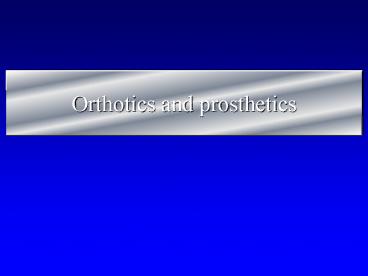Orthotics and prosthetics - PowerPoint PPT Presentation
1 / 28
Title:
Orthotics and prosthetics
Description:
Myoelectric - use intact proximal muscles to give electromyographic signals to ... Supination/pronation. Add thin washers to adjust sup/pro ... – PowerPoint PPT presentation
Number of Views:6005
Avg rating:3.0/5.0
Title: Orthotics and prosthetics
1
Orthotics and prosthetics
2
LE Prosthetics
- Residual limb shaping issues
- Weight bearing problems
- Use of stockings or socks
- Will they use it?
- Balance problems
- How hard is it to don/doff
- endoskeleton/exoskeleton
3
(No Transcript)
4
(No Transcript)
5
Cosmetic replacement minimal functional use but
excellent appearancematched to skin color
6
(No Transcript)
7
Myoelectric - use intact proximal muscles to give
electromyographic signals to move terminal device
8
body powered use cables and harness to move
terminal device by more proximal muscle movements
9
Hybrid systems - combination of body powered and
myoelectric
10
Terminal devices
- Voluntary opening hook or hand
- each rubber band gives 1 lb. force
- Voluntary closing hook or hand
- Cosmetic glove
- Passive hook
- Otto Bock
11
(No Transcript)
12
(No Transcript)
13
(No Transcript)
14
(No Transcript)
15
Remember...
- Skin should be unremarkable without irritation 10
minutes after removal - Initial wearing time on new prosthesis 20-30
minutes - if no redness which does not subside in 10
minutes, increase wearing time by 30 minutes per
day. - gradually increase wear time to develop tissue
strength - wash limb daily
- wear sock over residual limb
16
Terminal device operation
- Wrist flexion/extension
17
Supination/pronation
- Add thin washers to adjust sup/pro
- Small allen screw adjusts tension on sup/pro
18
Shoulder harness
- Northwestern ring goes slightly toward uninvolved
side of back - Prosthesis is on this side
19
(No Transcript)
20
(No Transcript)
21
AFO - Ankle foot orthosis
22
AFO - Ankle foot orthosis
- used to limit or assist in dorsiflexion or
plantarflexion - prevent mediolateral motion
- can be used to prevent or correct deformities or
contractures - when ankle component in plantarflexion, extension
moment created in knee - when ankle in dorsiflexion, flexion moment in
knee - reduce energy expenditure during gait
23
AFOs used on those with...
- CP
- foot drop
- peripheral neuropathy
- spastic hemiplegia
- polio
- MS
- TBI
24
Pressure Relieving AFO
25
Knee Stabilizing Orthoses
26
(No Transcript)
27
KAFO - knee ankle foot orthosis
- Same as AFO component to thigh to limit knee
motion - Used for pts with paralysis or weakness in ankle
and knee - Used to prevent genu recurvatum, genu varum (bow
leg), or valgus (knock knee) - Difficult to don/doff
28
Thoracolumbosacral orthosis
- Used to stabilize trunk and prevent scoliosis.
- Reduce compression on intervertebral
- reduces LBP
- S/P Scoliosis surgery usually worn 3 months
- Thoracolumbosacral flexion-extension control
orthosis - prevents excess flex/ext - Thoracolumbosacral flexion-extension-lateral
control - restricts flex/ext/lateral bending

